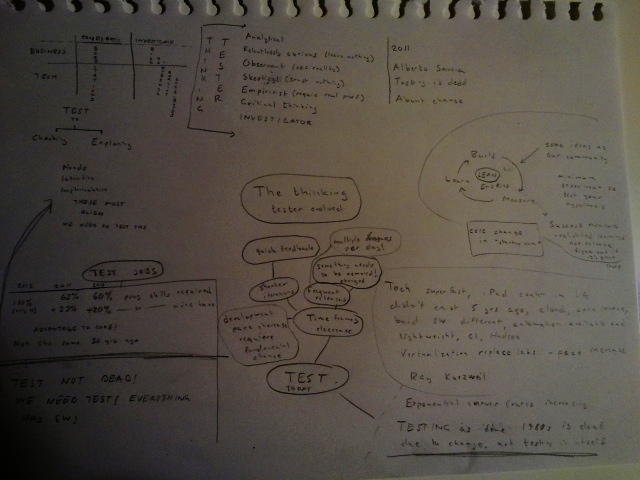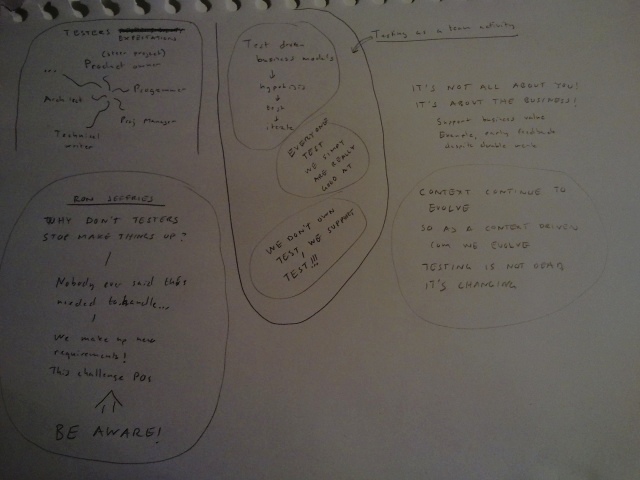May - Reaching out
When I was young (about two years ago) I started a blog. It was in Swedish, the topic was "make me famous" and it was gaping empty. In May I decided to pick it up again so I started writing a few posts, cursed myself for not being a brilliant writer anymore and finally translated the least horrible parts to English. My hope was that writing would somehow magically improve me as a tester and make people love me (I keep presenting myself as the loneliest man on earth).
The latter didn't really work out, the former though, even with the lack of magic, was spot on!
- Putting thoughts into words is a crucial skill! I'll explain why when we get to November but for now, just shut up and believe me.
- Helps you spot gaps and problems in your reasoning.
- Helps you raise questions you previously weren't aware of.
- Great practice to become a better observer.
- Great practice to better present your results.
- The comments you get can be provide key insights.
- Helped me learn to write in a more concise way.
- When writing down a problem the solution has a tendency to just show up (a bit like when you ask someone for help and as you put the problem into words you realize the solution... but without the someone).
- A good blog is great to point at when applying for a job.
- Writing skills are always important.
- Helps you process things you've learned/experienced.
- Helps you realize you're progressing.
- Writing a post you feel really good about helps boosting motivation.
- Sharing your experiences will put you in contact with interesting testers.
Why Every Professional Should Consider Blogging
Writing a Technical Blog: Why to do it and what to write about
Why must you write a technical blog?
7 Reasons Why Blogging Is Still Important in 2012
But the blog was actually not the most important initiative in May...
I chickened out on Let's Test but thanks to that conference I started following Johan Jonasson. One day, late in May, he made a retweet that would completely change the rest of this year. The tweet was about an EAST meetup in June. I joined the LinkedIn group and signed up...
June - Meeting non-imaginary people
EAST is an open network for software testers in the region I live in (Östergötland, Sweden). Once a month they meet up to listen to presentations and discuss testing in general. Going there was amazing! For the first time I was surrounded by brilliant, passionate testers, just the kind I wanted to become myself. Even though they gave me serious Let's Test envy, not to mention Rapid Software Testing envy, I loved every second.
Taking the step to meet others weren't really intimidating to me but, since I'm aware I'm an extrovert, I imagine it would be the challenge of a lifetime to some. If it's any consolation I was greeted warmly and helped along the moment I stepped through the door and I'm sure that's what most meetups look like. If still intimidated, try getting a colleague to join as well. I can tell you, if you make it there, it will change the speed you progress and your motivation in ways you can't imagine! Even if you just go there and listen you'll pick up so many interesting insights just from how great testers talk about and approach testing. When you build confidence enough (or, as in my case, can't shut up) you'll also discover a great chance to get quality feedback on your own problems as well as the power of having your ideas tossed back an forth between smart people. Finally, making friends that have a great interest in what you do for several hours a day is kinda awesome.
... Ohh, one more thing I forgot to mention. Other testers will love to hear about what you do, what you've experienced and how you deal with testing at the company you work so don't worry about being the quiet one, no one turns attention to, people will (maybe that was more intimidating than encouraging).
Other meetups in Sweden (Please send more suggestions)
SAST, Stockholm, Göteborg, Malmö, Örebro, Värmland
Passion for testing, Gothenburg
ConTest, Malmö
Inspired by the meetup and a brilliant presentation by Tobbe Ryber (unfortunately the slides seems to have been removed from the Nordic Testing Days' homepage) I created my Skill Development List. First it was just a silly list to make me feel good about my accomplishments but soon it turned into a tremendous resource for motivation and direction. I really urge you to make a similar plan and keep it updated as you progress, it's valuable no matter what level you're currently at! (ignorant people are the only ones dumb enough to ever be done learning).
I'm kind of an eccentric person when I really put my mind into something (like that's not already obvious). So, since i couldn't wait for the summer to end, I tackled the fear of screwing up/be rejected and planned an EAST meetup myself. However I choose a pub instead of a conference room to up the odds of people forgetting any bad parts (worked by the way). It turned out just fine and was a great boost to my confidence! Most important lesson? It's not hard to arrange a meetup, it just takes some courage (the initiative itself is enough be appreciated, a great end result is just a bonus).
Mindset
Hey, mindset is not a month! Maybe not in your calender... Screw it, no it's not, but it's crucial.
My mindset about testing, learning and thinking has changed a lot during this year. Here are some key mindsets that have helped me tremendously:
- I demand certain standards and am ready to fight for and make sacrifices to uphold them. I no longer accept fake work, low quality efforts or unmotivated constraints.
- I'm responsible for the environment around me, I don't expect anyone else to fix it for me.
- I don't fake understanding. Even if a question might hurt my status I need to ask it if I don't understand, simply because I want to be a pro not make others believe I'm a pro.
- I accept challenges even when public humiliation is almost guaranteed because I know challenges can teach me so much.
- I always perform tasks the best I can, even when it's not demanded, because I want to be proud of my actions.
- I accept that, even though proud, I will never be fully satisfied with my results because I will always be on the lookout for improvements.
- I won't accept to save myself by using silly excuses, blame others or hide behind papers! When I've done a bad job I'm accountable for that.
- I will not limit myself by what's considered taboo. If I find great potential for improvement and no one can come up with a valid reasons not to I will practice "professional disobedience" if necessary (break rules, within reasonable limits, to allow going forward).
- I will not pretend I've done a good job just because someone else says so. If I feel I've faked something it's a personal failure, nothing can change that.
- I want to empower and inspire the people around me by helping out, drive ideas, be a role model, spread my knowledge and support good ethics.
- I listen to anyone interested in sharing their experiences and I try to help them build on those but the latter is secondarily to the former.
Most of them are far from second nature to me yet (I still fake understanding and make up excuses for instance) while other more or less are (most notably high standards, which I'm really proud of). When some of these start to become your most important guides all the things around like respect, knowledge, skill and motivation will come by itself and it won't even feel like you're putting in an effort, that's why this is so important.
Insights so far
- The scariest, most challenging actions often present the greatest reward.
- The initiatives you don't take are the ones that will haunt you forever (why didn't I sign up for Let's Test, why?!). Failures? If nothing else they make great stories.
- Share your experiences with others, it helps making valuable connections, get feedback/insights/new perspectives and it helps you learn to explain what you're doing.
- Blog, blog blog
- Great testers won't ignore you, they will embrace you!
- Plan a local testing meetup, it will be educational, earn you respect and is a great confidence booster.
- Passion, inspiration and motivation rubs off, meet passionate people to become passionate.
- The sooner you meet great testers the sooner you'll become one yourself.
- Mindset, mindset, mindset
- Get yourself a plan of what you want to do (Skill Development List) and how you want to act (the list of mindsets further up).
- <<all the items on the mindset list>>
Starting level: Knowledgeable but incompetent
Finishing level: Inspired









